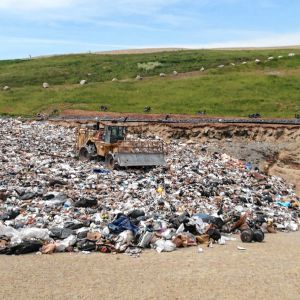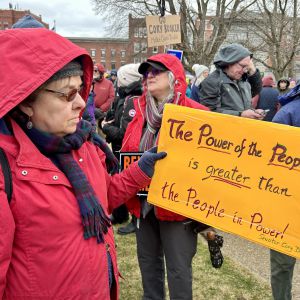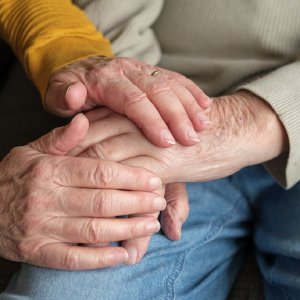Opinion: Reading Palestine and beyond

Palestinians displaced by the Israeli air and ground offensive on the Gaza Strip flee from parts of Khan Younis, following an evacuation order by the Israeli army to leave parts of the southern area of Gaza Strip's second largest city, Saturday, July 27. Abdel Kareem Hana / AP
| Published: 08-03-2024 6:00 AM |
Robert Azzi is a photographer and writer who lives in Exeter. His columns are archived at robertazzitheother.substack.com
In 2002, Palestinian-American Edward Said, professor of English and Comparative Literature and university professor at Columbia University, described an encounter with a Danish journalist during a scheduled interview.
Before starting to question Said, the journalist, who had come from Denmark, apologized for not having read the Qur’an in preparation for the interview.
Said answered, “‘If you met a Syrian coming to visit Denmark for the first time, would you suggest he should prepare himself by reading the Bible or by reading Hans Christian Andersen?’ Without hesitation, the journalist answered, ‘Andersen, of course.’ I then suggested that reading great contemporary novelists from the Islamic world, writers such as [Egyptian] Naguib Mahfouz, [Sudani] Tayeb Salih, [Palestinian-Iraqi] Jabra Jabra, or [Turkish-Kurdish] Yashar Kemal, might be more worthwhile than plowing through the Koran.”
I have read all those authors, as well as the Qur’an and Hebrew and Christian Bibles, and I think Said was right about “plowing” through scripture when there is often much truth and beauty in fiction and poetry as well.
I’ve been writing less lately, but I’ve been doing a lot of reading.
Reading Richard Scarry’s “Smokey the Fireman” to my grandson, multiple times!
Reading “The Neck and the Sword,” an amazing exchange between Rashid Khalidi and Tariq Ali, two of my favorite people, in the New Left Review.
Article continues after...
Yesterday's Most Read Articles
 ‘There was no oversight’: NH child advocate has been a watchdog for children's care. Now, the office is on the chopping block
‘There was no oversight’: NH child advocate has been a watchdog for children's care. Now, the office is on the chopping block
 Volunteer group wants to help homeless clean up their camp
Volunteer group wants to help homeless clean up their camp
 ‘Less finger pointing, more communication’: Longtime Chichester residents share hopes before second town meeting
‘Less finger pointing, more communication’: Longtime Chichester residents share hopes before second town meeting
 Casella Waste Systems’ landfill project in New Hampshire’s North Country denied permit
Casella Waste Systems’ landfill project in New Hampshire’s North Country denied permit
 New Healthy Buffalo owner to build market in Chichester
New Healthy Buffalo owner to build market in Chichester
 ‘It’s everything’: In largest rally yet, Trump protestors descend on Concord
‘It’s everything’: In largest rally yet, Trump protestors descend on Concord
Rereading — as I often do each July — some Ghassan Kanafani, whom I knew in Beirut and who was assassinated 52 years ago this month by Israel’s Mossad.
Mostly, though, I find myself these days reading amazing stories, poetry, and reflections by powerful, mostly Palestinian, women who write love letters to the world, often in blood, to let us know about what is happening in a part of the world that most westerners, particularly Americans, think of in pernicious and persistent colonialist and orientalist terms.
Courageous women who often must confront oppressive misogyny and patriarchy in their own lives and culture before then joining in the resistance struggle against occupation, oppression, and dispossession.
The mother of Palestinian poets, Fadwa Tuqan, wrote of love, resistance, and justice. In 1948 she began to write about al Nakba, the ethnic cleansing of Palestinians, their displacement and dispossession from lands and homes, and the attempted marginalization and erasure of their identity and culture:
“My sister, our land has a throbbing heart, it doesn’t cease to beat, and it endures the unendurable. It keeps the secrets of hills and wombs. This land sprouting with spikes and palms is also the land that gives birth to a freedom-fighter. This land, my sister, is a woman.”
Palestine is a woman — it endures the unendurable — and today Arab women confront the unendurable directly, unconventionally, in language that reveals, hurts, and liberates. And we cannot avoid it. We must not avoid it.
“Fucker, I thought to myself. So irritated by a stare! I wonder what your reaction would have been if you had lived under occupation for as many years as I had,” Palestinian architect and author Suad Amiry wrote in “Sharon and My Mother-in-Law: Ramallah Diaries.”
“Or if your shopping rights, like all of your other rights, were violated day and night, or if the olive trees in your grandfather’s orchards had been uprooted, or if your village had been bulldozed, or if your house had been demolished, or if your sister could not reach her school, or if your brother had been given three life sentences, or if your mother had given birth at a checkpoint, or if you had stood in a line for days in the hot August summers waiting for your work permit, or if you could not reach your beloved ones in Arab East Jerusalem ... A stare, and you lose your mind!”
Today I’m reading Suad Amiry’s “Mother of Strangers,” a beautifully crafted retelling of what unfolded in Palestine following Britain’s traitorous 1917 Balfour Declaration in which the British government supported the non-indigenous Zionist movement and the establishment of Israel as a “national home for the Jewish people” on Palestinian land.
Neither Balfour nor Britain had a right to give Palestinian land away.
Amiry’s novels offer a compelling rejection of the Zionist narrative about Israel’s foundation, a rejection of the persistent myth that Israel was founded on “a land without a people for a people without a land.” She reveals the inhumanity not only endured by Palestinians since the British Mandate but the reality of pain and dispossession that persists to this moment.
Other Palestinian women such as Asmaa Alatawna in “A Long Walk From Gaza,” Sarah Abulhawa in “Mornings in Jenin,” and Hala Alyan in “Salt Houses” offer vivid generational accounts of time critical to the history of the Middle East, even as the brutality and inhumanity of ethnic cleansing, genocide, and famine continue to be intentionally inflicted upon their people.
These are not fun reads ... these are not books for the beach but for the soul.
These authors, these creators of beauty, don’t try to explain the Middle East. They don’t get bogged down in details and ideology. They share with us their lived experiences, the stories learned from mothers and sittoos, grandmothers, stories of listening well and remembering everything.
From such powerful women — and from many others including Suheir Hammad, Naomi Shihab Nye, Najla Said — we learn the truth witnessed through their lives, their unfailing resistance to oppression and dispossession when giving up could have been so much easier, would have been safer. They have taught me so much.
One of my most compelling reads was Palestinian Adania Shibli’s “Minor Detail,” a two-part true story that was a National Book Award finalist and long-listed for the International Booker Prize.
In the first part “Minor Detail” is the true story of a gang rape and murder of a young Arab Bedouin-Palestinian girl by Israeli soldiers in 1949; in the second part, it’s a modern re-telling, as fiction, of what happens to a Palestinian woman who tries to investigate the girl’s rape and murder.
Shibli, who lives between Berlin and Jerusalem, in recognition of her work, was scheduled to be awarded the 2023 LiBeraturpreis at the Frankfurt Book Fair, an annual prize given to female writers from Africa, Asia, Latin America, or the Arab world, on Oct. 20, 2023.
Before the award ceremony, Shibli’s honor was postponed “due to the war started by Hamas, under which millions of people in Israel and Palestine are suffering.”
No prizes for Palestinians: they must all suffer as one.







 Opinion: Courage and care count
Opinion: Courage and care count
